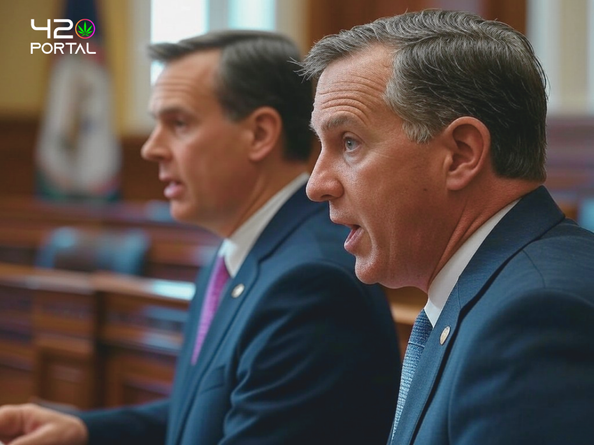Virginia Lawmakers Renew Push for Legal Cannabis Marketplace

12/27/2024
In a continued effort to establish a regulated cannabis market in Virginia, state lawmakers are once again addressing the issue with renewed vigor. Despite a veto from Governor Glenn Youngkin earlier this year, Virginia's General Assembly is poised to revisit the topic, driven by both public demand and the potential economic benefits of legalization.
The push for a legal cannabis marketplace has been a contentious issue, with Democrats advocating for a well-regulated system that could generate significant tax revenue, address social equity, and provide a legal alternative to the black market. The previous legislative session saw bills that would have allowed recreational cannabis sales to begin in 2025, but these were met with resistance from the Governor, who has expressed concerns over public health and safety.
Delegate Paul Krizek, a key proponent of legalization, emphasized the need for a thoughtful approach, suggesting that the current legislative session might see more bipartisan support, especially in the Senate. The aim is to create a framework where small businesses, particularly those owned by individuals from communities disproportionately affected by past marijuana laws, can thrive.
There's an acknowledgment that the road to legalization won't be easy, given the political divide. However, the economic argument for legalization is strong, with estimates suggesting billions in revenue from cannabis sales, akin to what other states have experienced. Advocates argue that legalizing cannabis would not only control the quality and safety of the product but also redirect funds from illegal markets to state coffers.
Critics, including Governor Youngkin, argue that legalization could lead to increased crime, health issues among young people, and an overall negative impact on community safety. They point to statistics from other states where legalization has been implemented, highlighting issues like youth access to cannabis and the potential for increased gang activity.
Despite these concerns, the momentum seems to be shifting. With more states across the U.S. legalizing recreational marijuana, there's growing pressure on Virginia to adapt to changing public attitudes and economic realities. The discussion now centers around how to regulate the market responsibly, ensuring that it benefits Virginians while mitigating potential downsides.
As Virginia heads into the 2025 legislative session, the debate over cannabis legalization remains a significant focal point, with both sides preparing for what could be a pivotal debate in the state's political landscape.
Reference
The push for a legal cannabis marketplace has been a contentious issue, with Democrats advocating for a well-regulated system that could generate significant tax revenue, address social equity, and provide a legal alternative to the black market. The previous legislative session saw bills that would have allowed recreational cannabis sales to begin in 2025, but these were met with resistance from the Governor, who has expressed concerns over public health and safety.
Delegate Paul Krizek, a key proponent of legalization, emphasized the need for a thoughtful approach, suggesting that the current legislative session might see more bipartisan support, especially in the Senate. The aim is to create a framework where small businesses, particularly those owned by individuals from communities disproportionately affected by past marijuana laws, can thrive.
There's an acknowledgment that the road to legalization won't be easy, given the political divide. However, the economic argument for legalization is strong, with estimates suggesting billions in revenue from cannabis sales, akin to what other states have experienced. Advocates argue that legalizing cannabis would not only control the quality and safety of the product but also redirect funds from illegal markets to state coffers.
Critics, including Governor Youngkin, argue that legalization could lead to increased crime, health issues among young people, and an overall negative impact on community safety. They point to statistics from other states where legalization has been implemented, highlighting issues like youth access to cannabis and the potential for increased gang activity.
Despite these concerns, the momentum seems to be shifting. With more states across the U.S. legalizing recreational marijuana, there's growing pressure on Virginia to adapt to changing public attitudes and economic realities. The discussion now centers around how to regulate the market responsibly, ensuring that it benefits Virginians while mitigating potential downsides.
As Virginia heads into the 2025 legislative session, the debate over cannabis legalization remains a significant focal point, with both sides preparing for what could be a pivotal debate in the state's political landscape.
Reference







